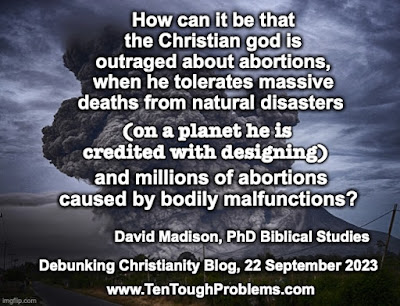Every Monday morning I'm posting submitted essays, excerpts from my books, and some of the best posts of the past. Here's one from January 17, 2012.
This topic interests me to no end. Why don't most believers seriously question their faith? Does it take a special type of individual? Does it require some personality trait that believers don't have? Does that make skeptics different people? Could it be intelligence? Could it be that skeptics have a higher self-esteem than others? Is it that we don't need social approval? Is it that life's experiences have shown us we cannot accept the dominant opinion on a matter? Is it that we question what we're told in general? Perhaps, but when we look at skeptics in general there doesn't seem to be a set pattern. Perhaps a scientific poll might help answer that kind of question. What I do think is that the following ten reasons are almost certainly necessary conditions even if they are not sufficient ones:
My plan is to post something of interest every Monday morning. These posts will include excerpts from my books, submitted essays, posts made here in the past, and new ones. Enjoy.
The Trickster’s Apprentice
By David Eller
At the end of the first part of Thus Spake Zarathustra, Nietzsche has Zarathustra withdraw into his solitude, asking, “what matter all believers? You have not yet sought yourselves: and you found me. Thus do all believers; therefore all faith amounts to so little.” In a previous essay, I introduced the figure of the trickster, the mischievous, unrestrained, shape-shifting boundary-crosser to whom many pundits have likened Trump. I realize now that that essay was the first of a two-part musing on faith and following, inspired by this cross-cultural fact: people don’t usually follow tricksters. They may laugh at him (since, as I pointed out previously, a trickster is almost always a male, at least at first), they may be aghast at his disrespect of morals and traditions, they may dread his baleful influence. A trickster is always a destroyer, usually a creator, sometimes a buffoon or cautionary tale, but virtually never a leader. Who would choose the trickster’s world of chimeras, deceptions, and insatiable appetites?
I had said I would post on Mondays. I will do so! The posts just won't always be excerpts, past postings, or submitted essays. But for now, go ahead and share the most important reason you believe, or disbelieve. Go!
Every Monday morning I'm posting submitted essays, excerpts from my books, and some of the best posts of the past. This post today is one of the first ones I made to this blog back in 2006. Enjoy!
Many Christians will claim that atheists simply do not have an ultimate motivation for being good. What motivates an atheist to be a good and kind person? Why should we act morally? J.P. Moreland believes atheists can and in fact do good moral deeds, “But what I’m arguing,” he says, “is, What would be the point? Why should I do these things if they are not satisfying to me or if they are not in my interests? [Does God Exist: The Great Debate (Thomas Nelson, 1990), pp. 118].
C. Stephen Layman argues in a similar fashion. He points out that the main difference between secular and religious moral views are that “the only goods available from a secular perspective are earthly goods,” whereas a religious perspective “recognizes these earthly goods as good, but it insists that there are non-earthly or transcendent goods.” Secular ethics, he says, must pay for the individual here on earth. “By way of contrast with the secular view, it is not difficult to see how morality might pay if there is a God of the Christian type.” [The Shape of the Good: Christian Reflections on the Foundations of Ethics (Univ. of Notre Dame Press, 1991)].
My plan is to post excerpts from my books on Mondays. This will include excerpts from all of the authors too. I must resist the urge to revise most everything I wrote! Okay now, OPEN THREAD!
LINK!! [Please subscribe to my YouTube channel.]
I'd love to find a planet where people agree on facts! As evidence that Earth is not that planet, a recent poll found that 63% of Republican Party members in the USA continue to believe Trump's Big Lie that he won the 2020 election. There's a phenomenon in psychology called denialism, a person's choice to deny reality as a way to avoid a psychologically uncomfortable truth. There is also disinformation propagated by various individuals and organized groups with the aim of confusing people about the facts. For example, the disinformation campaign funded by fossil fuel companies and conservative think tanks has sown profound confusion about the facts of climate science, much as the Tobacco Institute earlier pioneered the same FLICC model to dupe people into doubting the health hazards of tobacco use. (FLICC: fake experts, logical fallacies, impossible / inconsistent expectations (demanding an impossible standard of proof from the other side while requiring little or no standard from one's own side), cherry picking, conspiracy ideation. I'd like to squeeze in a letter T for tribalism / team loyalty, but that would wreck the acronym.)
Religionists and denialists use similar methods, and are sometimes the same people. I suspect Trump's appeal to America's Christians is due to the preparatory work most of them received via religious indoctrination. They acquired the habit of trusting the verbal pronouncements of their team's authorities without evidence or fact-checking. All Trump had to do was move into the cognitive house already built.

















